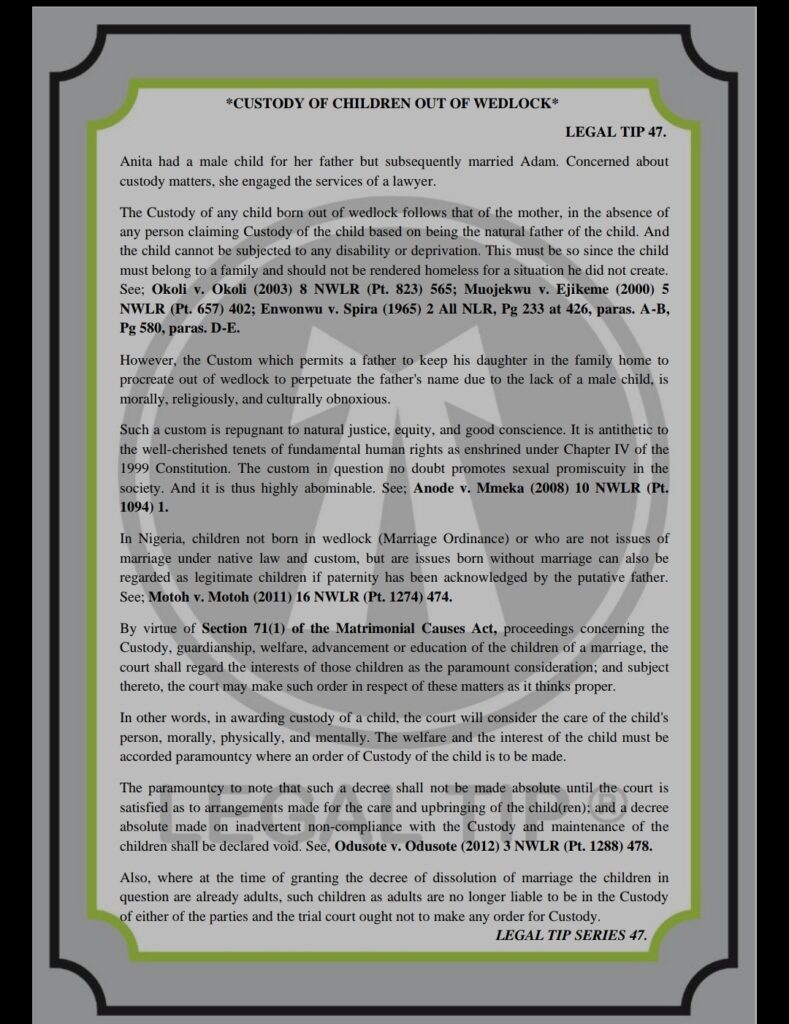Anita had a male child for her father but subsequently married Adam. Concerned about custody matters, she engaged the services of a lawyer.
The Custody of any child born out of wedlock follows that of the mother, in the absence of any person claiming Custody of the child based on being the natural father of the child.
And the child cannot be subjected to any disability or deprivation. This must be so since the child must belong to a family and should not be rendered homeless for a situation he did not create. See; Okoli v. Okoli (2003) 8 NWLR (Pt. 823) 565; Muojekwu v. Ejikeme (2000) 5 NWLR (Pt. 657) 402; Enwonwu v. Spira (1965) 2 All NLR, Pg 233 at 426, paras. A-B, Pg 580, paras. D-E.
However, the Custom which permits a father to keep his daughter in the family home to procreate out of wedlock to perpetuate the father’s name due to the lack of a male child, is morally, religiously, and culturally obnoxious.
Such a custom is repugnant to natural justice, equity, and good conscience. It is antithetic to the well-cherished tenets of fundamental human rights as enshrined under Chapter IV of the 1999 Constitution. The custom in question no doubt promotes sexual promiscuity in the society. And it is thus highly abominable. See; Anode v. Mmeka (2008) 10 NWLR (Pt. 1094) 1.
In Nigeria, children not born in wedlock (Marriage Ordinance) or who are not issues of marriage under native law and custom, but are issues born without marriage can also be regarded as legitimate children if paternity has been acknowledged by the putative father. See; Motoh v. Motoh (2011) 16 NWLR (Pt. 1274) 474.
By virtue of Section 71(1) of the Matrimonial Causes Act, proceedings concerning the Custody, guardianship, welfare, advancement or education of the children of a marriage, the court shall regard the interests of those children as the paramount consideration; and subject thereto, the court may make such order in respect of these matters as it thinks proper.
In other words, in awarding custody of a child, the court will consider the care of the child’s person, morally, physically, and mentally. The welfare and the interest of the child must be accorded paramountcy where an order of Custody of the child is to be made.

The paramountcy to note that such a decree shall not be made absolute until the court is satisfied as to arrangements made for the care and upbringing of the child(ren); and a decree absolute made on inadvertent non-compliance with the Custody and maintenance of the children shall be declared void. See, Odusote v. Odusote (2012) 3 NWLR (Pt. 1288) 478.
Also, where at the time of granting the decree of dissolution of marriage the children in question are already adults, such children as adults are no longer liable to be in the Custody of either of the parties and the trial court ought not to make any order for Custody.




Thank you great post. Hello Administ .Seo Hizmeti Skype : live:by_umut